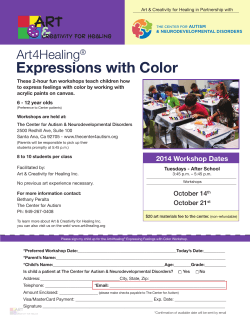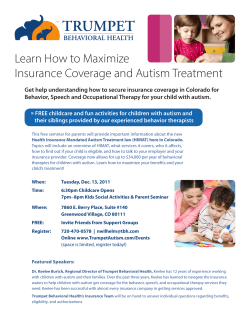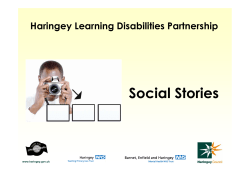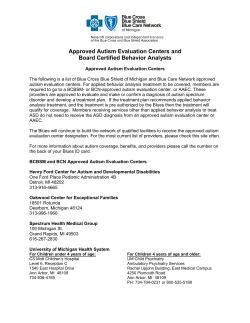
Winter 2015 - Children's Hospital Los Angeles
The Boone Fetter Clinic: Diagnostic, Clinical and Research Center for Autism and Other Neurodevelopmental and Behavioral Disorders THE DEVELOPING MIND WINTER 2015 Cultural Factors Influence How We Experience Autism, Page 2 Welcome It is sometimes difficult to find a trustworthy source for answers to complex questions about your child’s health and development, so we provide this newsletter to bring you up-to-date information from specialists and researchers at Children’s Hospital Los Angeles, a proud member of the Autism Speaks Autism Treatment Network. For more information about the Boone Fetter Clinic, or if you have a question about your child’s development, please call the Autism Warm Line at 323-361-6102. In This Edition: 2 Cultural Factors Influence How We Experience Autism 3 Research Highlight: Understanding Autism Disparities 4 Research Opportunity: Treating Tummy Troubles to Improve Behavior 4 Bradley Peterson, MD, Named Director of the Institute for the Developing Mind To make an appointment, call the Autism Warm Line at 323.361.6102, email BooneFetterClinic@chla.usc.edu or visit CHLA.org/AUTISM. 1300 N. Vermont Ave., Ste. 905, Los Angeles, CA 90027 Cultural Factors Influence How We Experience Autism Research Highlight: Understanding Autism Disparities Throughout the country, Latino and AfricanAmerican children are less likely to receive an ASD diagnosis and related intervention services. Yet no evidence suggests that autism rates are actually lower in these communities. Rather, the problem appears to lie in access to care. Developing programs to address this health disparity is important because early intervention is critical to improving health outcomes for children with neurodevelopmental disorders. A research team from the Boone Fetter Clinic launched a community-partnered research project to better understand gaps in autism diagnosis and care among African-American and Latino children—and to develop interventions to address them. Cultural sensitivity requires learning about and getting to know people who are different from us so that we can understand how to interact more effectively. This is an important skill for health workers, doctors and nurses, because patients and families can come from a wide range of cultural backgrounds. Autism spectrum disorder (ASD) affects people of all backgrounds, shapes, sizes, cultures and heritages. Different cultural factors can change how individuals experience autism in everyday life, influencing their interactions with family, community, schools and health services. Cultural factors can also impact how autism is understood, interpreted and accepted in different communities. Cultural myths about autism and other disabilities can deter people from seeking help. Information that may be helpful for one person might be too much, or too little, or even confusing for another. There can even be many cultural differences within the same ethnic group, 2 due to factors like country of birth and number of years in the United States. Research shows that in communities like Los Angeles, non-white families or recent immigrant families can have a more difficult time getting developmental services, which often delays a proper diagnosis. At the Boone Fetter Clinic, we understand that knowing a family’s cultural background provides insight into how the family thinks about its child’s development or condition, as well as how social and cultural factors can influence how the family cares for the child and accesses services. Cultural sensitivity tips In interactions with individuals and families affected by autism, understanding cultural backgrounds and how they may affect behavior and the ability to communicate can go a long way toward developing genuine and effective relationships. Keep in mind these cultural sensitivity tips, inspired by autism author Monica Holloway and behavioral speech pathologist Julie Diep, when you meet with friends, family or others who are affected by autism: Learn about the culture and heritage of diverse communities. Get to know what people consider “normal” in different cultures. Recognize that there may be a language barrier. Take the time to listen. CULTURAL FACTORS • Language • Geographic location • Religion • Nationality • Economic status • Gender • Beliefs and values • Family structure • Ethnicity Together with community partners, the team wanted to understand the challenges that families in the Los Angeles area face in accessing developmental screenings, diagnostic services and treatments for their children. The researchers joined with four regional centers and other local service providers to engage 56 African-American and Latino parents of children with ASD in focus group discussions to help identify and address barriers to care. Their findings identified three overarching needs: Parent education: Overall, Latino and African-American parents tended to have limited knowledge about autism before or after their children’s diagnoses. They were aware of their children’s developmental delays, but didn’t identify these symptoms as indicating autism. Lack of support from spouses and other family members often complicated this issue. Too often, the concerned parent was told not to worry, or that the child would “grow out of it.” Assistance navigating complicated service systems: Many parents were unsure how to get screenings or diagnostic evaluations for their child. Often, their family physicians dismissed their concerns or they were told to come back if their child was not talking by the time he or she started school. Often, parents reported feeling that the disregard for their concerns was related to their ethnicity. Latino parents clearly expressed the need for pediatricians to learn how to effectively listen and communicate with them. These parents said that when they were finally referred to an autism center, they felt relief. But even then, many reported facing a new round of challenges. Health disparities are preventable differences in the burden of disease, injury, violence or opportunities to achieve optimal health that are experienced by socially disadvantaged populations. -Centers for Disease Control and Prevention They described how they had to fight for services without knowing what to ask for or what might be most helpful for a child with autism. Need for parental advocacy training: Many of the parents also reported they lacked the legal resources and strong advocacy skills needed when trying to get services for their child—both at autism care centers and during their child’s individualized education plan (IEP) meetings at school. In the focus groups, they identified cultural barriers such as language differences and being reticent to question a doctor’s judgment. As mentioned earlier, many also lacked family support in pursuing autism services for their child. Moving forward to address these cultural needs: The research team from the Boone Fetter Clinic is now focused on creating new resources and programs to address these concerns, and to help achieve earlier autism diagnoses and access to services for Latino and AfricanAmerican families. Learn more about how we are working with promotores and health navigators in the next issue of The Developing Mind newsletter. This important work is being done in partnership with the Southern California Clinical and Translational Science Institute and the Autism Speaks Autism Treatment Network. 3 Cultural Factors Influence How We Experience Autism Research Highlight: Understanding Autism Disparities Throughout the country, Latino and AfricanAmerican children are less likely to receive an ASD diagnosis and related intervention services. Yet no evidence suggests that autism rates are actually lower in these communities. Rather, the problem appears to lie in access to care. Developing programs to address this health disparity is important because early intervention is critical to improving health outcomes for children with neurodevelopmental disorders. A research team from the Boone Fetter Clinic launched a community-partnered research project to better understand gaps in autism diagnosis and care among African-American and Latino children—and to develop interventions to address them. Cultural sensitivity requires learning about and getting to know people who are different from us so that we can understand how to interact more effectively. This is an important skill for health workers, doctors and nurses, because patients and families can come from a wide range of cultural backgrounds. Autism spectrum disorder (ASD) affects people of all backgrounds, shapes, sizes, cultures and heritages. Different cultural factors can change how individuals experience autism in everyday life, influencing their interactions with family, community, schools and health services. Cultural factors can also impact how autism is understood, interpreted and accepted in different communities. Cultural myths about autism and other disabilities can deter people from seeking help. Information that may be helpful for one person might be too much, or too little, or even confusing for another. There can even be many cultural differences within the same ethnic group, 2 due to factors like country of birth and number of years in the United States. Research shows that in communities like Los Angeles, non-white families or recent immigrant families can have a more difficult time getting developmental services, which often delays a proper diagnosis. At the Boone Fetter Clinic, we understand that knowing a family’s cultural background provides insight into how the family thinks about its child’s development or condition, as well as how social and cultural factors can influence how the family cares for the child and accesses services. Cultural sensitivity tips In interactions with individuals and families affected by autism, understanding cultural backgrounds and how they may affect behavior and the ability to communicate can go a long way toward developing genuine and effective relationships. Keep in mind these cultural sensitivity tips, inspired by autism author Monica Holloway and behavioral speech pathologist Julie Diep, when you meet with friends, family or others who are affected by autism: Learn about the culture and heritage of diverse communities. Get to know what people consider “normal” in different cultures. Recognize that there may be a language barrier. Take the time to listen. CULTURAL FACTORS • Language • Geographic location • Religion • Nationality • Economic status • Gender • Beliefs and values • Family structure • Ethnicity Together with community partners, the team wanted to understand the challenges that families in the Los Angeles area face in accessing developmental screenings, diagnostic services and treatments for their children. The researchers joined with four regional centers and other local service providers to engage 56 African-American and Latino parents of children with ASD in focus group discussions to help identify and address barriers to care. Their findings identified three overarching needs: Parent education: Overall, Latino and African-American parents tended to have limited knowledge about autism before or after their children’s diagnoses. They were aware of their children’s developmental delays, but didn’t identify these symptoms as indicating autism. Lack of support from spouses and other family members often complicated this issue. Too often, the concerned parent was told not to worry, or that the child would “grow out of it.” Assistance navigating complicated service systems: Many parents were unsure how to get screenings or diagnostic evaluations for their child. Often, their family physicians dismissed their concerns or they were told to come back if their child was not talking by the time he or she started school. Often, parents reported feeling that the disregard for their concerns was related to their ethnicity. Latino parents clearly expressed the need for pediatricians to learn how to effectively listen and communicate with them. These parents said that when they were finally referred to an autism center, they felt relief. But even then, many reported facing a new round of challenges. Health disparities are preventable differences in the burden of disease, injury, violence or opportunities to achieve optimal health that are experienced by socially disadvantaged populations. -Centers for Disease Control and Prevention They described how they had to fight for services without knowing what to ask for or what might be most helpful for a child with autism. Need for parental advocacy training: Many of the parents also reported they lacked the legal resources and strong advocacy skills needed when trying to get services for their child—both at autism care centers and during their child’s individualized education plan (IEP) meetings at school. In the focus groups, they identified cultural barriers such as language differences and being reticent to question a doctor’s judgment. As mentioned earlier, many also lacked family support in pursuing autism services for their child. Moving forward to address these cultural needs: The research team from the Boone Fetter Clinic is now focused on creating new resources and programs to address these concerns, and to help achieve earlier autism diagnoses and access to services for Latino and AfricanAmerican families. Learn more about how we are working with promotores and health navigators in the next issue of The Developing Mind newsletter. This important work is being done in partnership with the Southern California Clinical and Translational Science Institute and the Autism Speaks Autism Treatment Network. 3 Research Opportunity: Treating Tummy Troubles to Improve Behavior Levitt, PhD, who is leading the research. His goal is to set clear guidelines for how doctors can personalize treatments that help with both GI distress and autism symptoms. The hope is that effectively treating tummy troubles could also reduce the need for behavioral medications for many children. Researchers at Children’s Hospital Los Angeles have started a new research study focused on kids with autism spectrum disorder (ASD) who also have tummy troubles like constipation and bloating. These gastrointestinal (GI) issues are very common in kids on the spectrum and can create a lot of discomfort, often making school and social interactions more difficult. “We want to see if successful GI treatment helps children with ASD become more receptive to social interactions,” says Pat The research team is currently looking for 120 volunteers to take part in this important study, which is funded by Autism Speaks. Volunteers will receive the highest standard of care to relieve their constipation, including regular checkups to look at behavioral changes over the course of one year. If you are interested in participating and want to find out more information about the study, please contact the study team at tummytroubles@chla.usc.edu. Bradley Peterson, MD, Named Director of the Institute for the Developing Mind The Institute for the Developing Mind (IDM) at Children’s Hospital Los Angeles is focused on understanding how children’s brains develop, in order to improve understanding, treatment and prevention of neurodevelopmental disorders. Recently, Bradley Peterson, MD, was named the IDM’s inaugural director. Peterson is a psychiatrist known around the world as an expert in the development of children’s brains, minds and behaviors. He uses brain-imaging technology, such as MRI, to understand the origins of neurodevelopmental disorders, and to map the complex pathways between the genetic Autism Warm Phone Line: 323.361.6102 4 and environmental influences that can trigger the onset or progression of these disorders. Peterson has vast experience as a researcher, clinician and teacher, and will provide transformative leadership at the Institute. In addition to leading the IDM, he is a professor of Pediatrics and Psychiatry at the Keck School of Medicine of the University of Southern California. The Autism Warm Phone Line and The Developing Mind newsletter are made possible by grants from the Sharon D. Lund Foundation and the William Randolph Hearst Foundation.
© Copyright 2025









